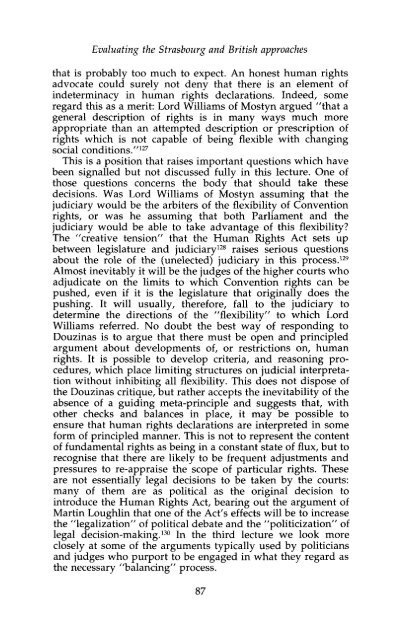Human Rights, Serious Crime and Criminal Procedure - College of ...
Human Rights, Serious Crime and Criminal Procedure - College of ...
Human Rights, Serious Crime and Criminal Procedure - College of ...
- No tags were found...
You also want an ePaper? Increase the reach of your titles
YUMPU automatically turns print PDFs into web optimized ePapers that Google loves.
Evaluating the Strasbourg <strong>and</strong> British approachesthat is probably too much to expect. An honest human rightsadvocate could surely not deny that there is an element <strong>of</strong>indeterminacy in human rights declarations. Indeed, someregard this as a merit: Lord Williams <strong>of</strong> Mostyn argued "that ageneral description <strong>of</strong> rights is in many ways much moreappropriate than an attempted description or prescription <strong>of</strong>rights which is not capable <strong>of</strong> being flexible with changingsocial conditions." 127This is a position that raises important questions which havebeen signalled but not discussed fully in this lecture. One <strong>of</strong>those questions concerns the body that should take thesedecisions. Was Lord Williams <strong>of</strong> Mostyn assuming that thejudiciary would be the arbiters <strong>of</strong> the flexibility <strong>of</strong> Conventionrights, or was he assuming that both Parliament <strong>and</strong> thejudiciary would be able to take advantage <strong>of</strong> this flexibility?The "creative tension" that the <strong>Human</strong> <strong>Rights</strong> Act sets upbetween legislature <strong>and</strong> judiciary 128 raises serious questionsabout the role <strong>of</strong> the (unelected) judiciary in this process. 129Almost inevitably it will be the judges <strong>of</strong> the higher courts whoadjudicate on the limits to which Convention rights can bepushed, even if it is the legislature that originally does thepushing. It will usually, therefore, fall to the judiciary todetermine the directions <strong>of</strong> the "flexibility" to which LordWilliams referred. No doubt the best way <strong>of</strong> responding toDouzinas is to argue that there must be open <strong>and</strong> principledargument about developments <strong>of</strong>, or restrictions on, humanrights. It is possible to develop criteria, <strong>and</strong> reasoning procedures,which place limiting structures on judicial interpretationwithout inhibiting all flexibility. This does not dispose <strong>of</strong>the Douzinas critique, but rather accepts the inevitability <strong>of</strong> theabsence <strong>of</strong> a guiding meta-principle <strong>and</strong> suggests that, withother checks <strong>and</strong> balances in place, it may be possible toensure that human rights declarations are interpreted in someform <strong>of</strong> principled manner. This is not to represent the content<strong>of</strong> fundamental rights as being in a constant state <strong>of</strong> flux, but torecognise that there are likely to be frequent adjustments <strong>and</strong>pressures to re-appraise the scope <strong>of</strong> particular rights. Theseare not essentially legal decisions to be taken by the courts:many <strong>of</strong> them are as political as the original decision tointroduce the <strong>Human</strong> <strong>Rights</strong> Act, bearing out the argument <strong>of</strong>Martin Loughlin that one <strong>of</strong> the Act's effects will be to increasethe "legalization" <strong>of</strong> political debate <strong>and</strong> the "politicization" <strong>of</strong>legal decision-making. 130 In the third lecture we look moreclosely at some <strong>of</strong> the arguments typically used by politicians<strong>and</strong> judges who purport to be engaged in what they regard asthe necessary "balancing" process.87
















